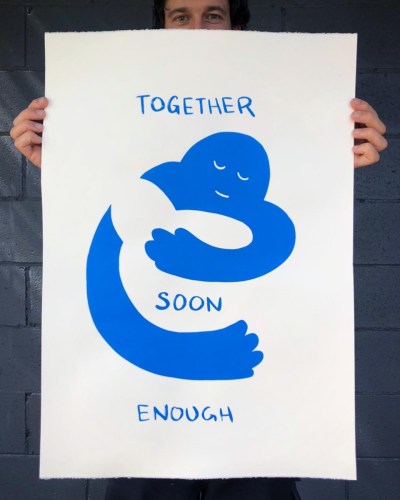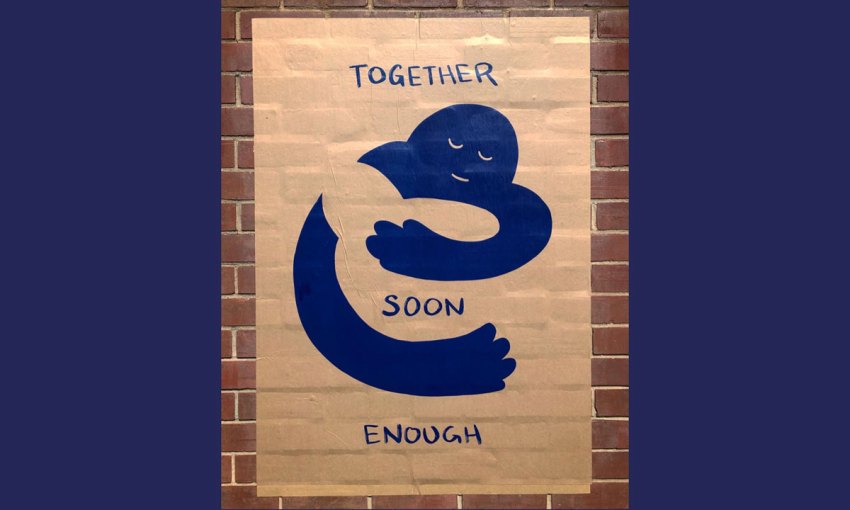Who doesn’t feel like they need a hug right now?
Peter Drew’s poster love in the time of COVID-19
SPECIAL REPORT: COVID-19 ADELAIDE
It was missing a regular weekly catch-up with extended family that prompted Adelaide artist Peter Drew’s latest lightbulb moment.
Every Sunday, he and fashion designer partner Julie White usually go to dinner at the home of Julie’s 87-year-old Italian grandmother Rose – affectionately known as Mumma – with anywhere up to 20 other members of their extended family.
See more of Peter Drew’s work on his website.
They share a meal, good times, and – invariably – a cake, “because it’s always someone’s birthday”.
But the COVID-19 restrictions imposed on social gatherings brought the tradition to a sudden halt a few weeks ago.
“It holds the whole family together; it puts a full stop on the end of the week,” Peter says of the dinner.
“It’s like an institution. And for the first time in a long time we weren’t having it … that night we were missing it and I had an impulse to design something based on that feeling.”
That something was a new poster. And unlike Peter’s previous posters – which have sought to provoke conversations on issues such as gun control and the treatment of asylum seekers – this one is not political.
Bearing the words Together Soon Enough, it’s inspired by our human need for physical affection. That need is most keenly felt during a time of crisis, yet in the battle against this pandemic, distance is our best defence.
“I think everyone is going through the same thing, and that’s discovering how much we need each other and how that closeness is something we long for when it’s taken away,” Peter says.
“It’s ironic that in order to protect the ones we love, we have to be distant from them.”
Peter has already stuck up several of his new posters in Port Adelaide, where he lives, and plans to put more around the Adelaide CBD. They’re also available to order on his website.
“This new poster is something a bit different for me – it’s a new pathway, so I’m excited to see where it goes.”

Photo: Supplied
Despite the difficulties created by the current crisis, there is a sense of optimism in the words and design of the poster, which reflects Peter’s hope that the pandemic might ultimately leave us with an increased sense of unity within the community.
“I was looking at social media and there were people still running on the old paradigm of political bickering – it’s not the time for that,” he says.
“Once the dust settles we can lay blame if need be, but at the moment it’s important that people stick together and we get through this…
“That’s not a terrible feeling: there’s something refreshing about that sense of unity. We all have something in common.”
Working from home with Peter & Julie
Peter and Julie have both been working from home for years. As hundreds of thousands of other couples struggle to adapt to living and working together in close quarters, they’ve shared some tips on Facebook for mastering the challenge without driving each other to distraction.
(“The most fundamental one is respect for the boundaries,” Peter says. “That’s the one I have the most trouble with.”)
1: Have a designated space each – a defined work space makes the boundaries clear when you’re working and not.
2: Show respect for each other’s work space – sounds obvious, but demonstrating it through small actions makes a big difference. It could be as simple as knocking on the door before you enter their space, and if [there’s] no door – knock on something!
3: Respect each other’s working HEADSPACE – Like the door knocking scenario, if you’ve got something buzzing around in your head you’d like to blurt out while they’re working, don’t. It’s polite to ask first “do you mind if I ask you something about blah de blah blah?”. But also consider first if you’re just being a distraction…if yes, you can save it for later when you’re both not working.
4: Set time for work, and time for each other – very important when the boundaries are invisible.
5: Your partner is not a human notepad – While it’s not wise to use each other to dump your working brain onto, it’s OK if you need help at times when you’re just plain stuck. Use it as an opportunity to listen, too. Maybe they might need help with their own thing too? Sharing is caring.
6: Have a proper lunch break together – Don’t forget to break up your day, have a stretch and keep the human contact going! Meet by the pretend water cooler before you circle back to the emails.
7: Accept you’re not going to be 100% in sync for work on and off times – A hard one! But communication is key.




